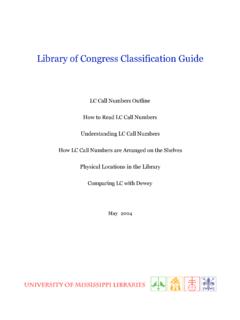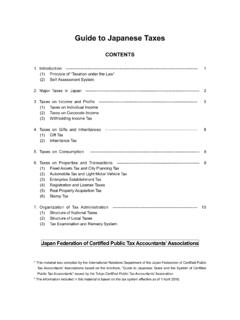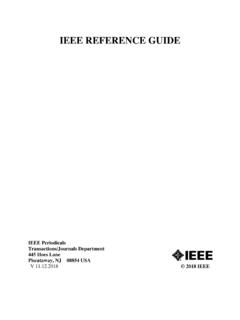Transcription of Japanese Grammar Guide
1 Japanese Grammar GuideTae KimNovember 21, 2012 Contents1 The problem with conventional textbooks.. A Japanese Guide to learning Japanese Grammar .. Suggestions..132 The Writing The Scripts.. Intonation.. Hiragana.. The Muddied Sounds.. The Small and .. The Small .. The Long Vowel Sound.. Katakana.. The Long Vowel Sound.. The Small .. Some examples of words in Katakana.. Kanji.. What is Kanji?.. Learning Kanji.. Reading Kanji.. Why Kanji?..283 Basic Basic Grammatical Structures.. Expressing State-of-Being.. Declaring something is so and so using .. Conjugating to the negative state-of-being.. Conjugating to the past state-of-being.. Conjugation summary.. Introduction to Particles.. Defining grammatical functions with particles.
2 The topic particle.. The inclusive topic particle.. The identifier particle.. Adjectives.. Properties of Adjectives.. The na-adjective.. The i-adjective.. An annoying exception.. Verb Basics.. Role of Verbs.. Classifying verbs into ru-verbs and u-verbs.. Appendix: iru/eru u-verbs.. Negative Verbs.. Conjugating verbs into the negative.. Past Tense.. Past tense for ru-verbs.. Past tense for u-verbs.. Past-negative tense for all verbs.. Particles used with verbs.. The direct object particle.. The target particle.. The directional particle.. The contextual particle.. When location is the topic.. When direct object is the topic.. Transitive and Intransitive Verbs.. Pay attention to particles!.. Relative Clauses and Sentence Order.
3 Treating verbs and state-of-being like adjectives.. Using state-of-being clauses as adjectives.. Using relative verb clauses as adjectives.. Japanese Sentence Order.. Noun-related Particles.. The last three particles.. The Inclusive particle.. The Vague Listing and particles.. The particle.. The particle as explanation.. Adverbs and Sentence-ending particles.. Properties of Adverbs.. Sentence-ending particles.. sentence ending.. sentence ending.. Combining both to get ..814 Essential Polite Form and Verb Stems.. Not being rude in Japan.. The stem of verbs.. Using to make verbs polite.. Using for everything else.. is NOT the same as .. Addressing People.. Referring to yourself.. Referring to others by name.. Referring to others with "you".
4 Referring to others in third person.. Referring to family members.. The Question Marker.. Questions in polite form.. The question marker in casual speech.. used in relative clauses.. Using question words.. Compound Sentences.. Expressing a sequence of states.. Expressing a sequence of verbs with the te-form.. Expressing reason or causation using and .. Using to mean "despite".. Expressing contradiction using and .. Expressing multiple reasons using .. Expressing multiple actions or states using .. Other uses of the te-form.. Using for enduring states.. Enduring state-of-being vs enduring state of action.. Using for resultant states.. Using the form as preparation for the future.. Using motion verbs ( ) with the te-form.
5 Potential Form.. Expressing the ability to do something.. The Potential Form.. Potential forms do not have direct objects.. Are and exceptions?.. , yet another exception.. Using and with the particle.. Using and for nouns and na-adjectives.. Using with i-adjectives.. Using and with verbs.. Conditionals.. How to say "if" in Japanese .. Expressing natural consequence using .. Contextual conditionals using ( ) .. General conditionals using .. Past conditional using ( ) .. How does fit into all of this?.. Expressing "must" or "have to".. When there's something that must or must not be done.. Using , , and for things that must notbe done.. Expressing things that must be done.. Various short-cuts for the lazy.
6 Saying something is ok to do or not do.. Desire and Suggestions.. How to get your way in Japan.. Verbs you want to do with .. Indicating things you want or want done using .. Making a motion to do something using the volitional form.. Making a motion to do something using the volitional form.. Making Suggestions using the or conditional.. Performing an action on a relative clause.. The direct quote.. The interpreted quote.. Using as a casual version of .. Defining and Describing.. The various uses of .. Using to define.. Using to describe anything.. Rephrasing and making conclusions with .. Using or for .. Saying instead of .. Trying something out or attempting to do something.. Let's try some stuff.. To try something out.
7 To attempt to do something.. Giving and Receiving.. Japanese people like gifts.. When to use .. When to use .. When to use .. Asking favors with or .. Making requests.. Politely (and not so politely) making requests.. a special conjugation of .. Using as a casual request.. Using to make firm but polite requests.. The Command Form.. Negative Command.. Numbers and Counting.. The Number System.. Counting and Counters.. Using to show order.. Casual Patterns and Slang.. Basic Principles of Slang.. Sentence ordering and particles.. Using instead of to confirm.. Using for .. Using and to show exasperation.. Using just about everywhere.. Showing contempt for an action with .. More sentence-ending particles.
8 And sentence-ending particles.. and sentence-ending particles.. Gender-specific sentence-ending particles.. That's a wrap!..2065 Special Causative and Passive Verbs.. Causative Verbs.. Passive Verbs.. Using passive form to show politeness.. Causative-Passive Forms.. Honorific and Humble Forms.. Set Expressions.. Other substitutions.. Honorific and Humble Conjugations.. Making honorific requests.. Things that happen unintentionally.. Using with other verbs.. Using the casual version of .. Another meaning of .. Expressions with generic nouns.. Using to say whether something has happened.. Using as an abstract place.. Using as a casual feminine way to emphasize.. Expressing levels of certainty.. Using to express uncertainty.
9 Using to express a fair amount of certainty.. Using and to express strong amount of Expressing amounts.. Indicating that's all there is using .. Using as a formal version of .. Indication that there's nothing else using .. Expressing the opposite of with .. Saying there's too much of something using .. Adding the particle to express excessive amounts.. Using to express the extent of something.. Using with adjectives to indicate an amount.. Express similarity and hearsay.. Expressing similarity with .. Using to say something looks like something else.. Guessing at an outcome using .. Expressing hearsay using .. Expressing hearsay or behavior using .. : Slang expression of similarity.
10 Using and for comparisons, etc.. Using for comparisons.. Using for comparisons.. Using to express a way to do something.. Using to express dependency.. Indicating a source of information using .. Saying something is easy or difficult to do.. Variations of with and .. More negative verbs.. Doing something without doing something else.. A casual masculine type of negative that ends in .. A classical negative verb that ends in .. Hypothesizing and Concluding.. Coming to a conclusion with .. Making hypotheses with .. Expressing time-specific actions.. Expressing what just happened with .. Express what occurred immediately after with .. Using for two concurrent actions.. Using with state-of-being.











